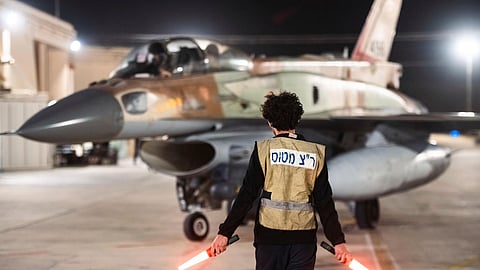Israel-Iran war seems to be scaling down with restraint on both sides: Ex-Indian foreign secretary
BENGALURU: Israel's strategy in its war against Iran seems to be scaling down from the concept of escalation dominance to classical deterrence, said India's former foreign secretary and former ambassador to Israel Ranjan Mathai during a talk on 'The Middle East Quagmire: Will the Iran-Israel war spiral further?', organised by the city-based think tank Synergia Foundation on Monday.
He said while it is difficult to predict the future of the war between the two countries, there seems to be some amount of stepping back from both sides. On October 26, Israel had launched direct strikes on military targets in Tehran and the western provinces of Ilam and Khuzestan in retaliation for Iran’s October 1 attack on Israel with about 200 ballistic missiles, but spared its oil and nuclear facilities.
“While Israel demonstrated that it has the capacity to carry deadly and precision strikes against Tehran, it seems to have deliberately avoided hitting the former’s oil fields and nuclear facilities because that would have escalated the war and led to the spiralling of oil prices around the world. Iran’s supreme leader Ayatollah Ali Khamenei’s response to Israel’s targeted airstrikes was also measured,” said Mathai.
Khamenei had advised against exaggeration or downplaying of Israel’s strikes avoiding direct calls for retaliation. On Sunday, Iran vowed to respond to Israel’s strikes but said it did not want a wider war.
“Iran needs time (to retaliate). Its economy (because of long-standing US sanctions) and internal cohesion are weakening. There are factions within the Islamic Revolutionary Guard Corps (IRGC) and there are rifts within the Iranian establishment. Israel on the other hand, has military and technological capacity (to attack Iran) but it needs the support of the US. Its economic vulnerability has also started showing up because of the war. Israel was spending four to five percent of its GDP on defence in 2022. Its defence expenditure has doubled since then. In 2024, it should be close to nine per cent of its GDP," he said.
Israel needs to maintain its line of communication with the US, which is their biggest ally and arms supplier. "A very large percentage of Israeli missiles for its missile defence comes from the US as the Israeli industry struggles to replace its fast depleting stocks,” said Mathai.
The other significant fallout of the war has been “brain drain, with many young Israelis migrating to the US. There are also growing fissures between Prime Minister Benjamin Netanyahu and Defence Minister Yoav Gallant with the former’s cabinet ministers calling for the latter’s ouster,” he added.
On the global impact of a full-blown war between Israel and Iran, Mathai said, “The first victim would be the global oil market including India if there’s a breakdown in the Strait of Hormuz.” The 21-mile-wide waterway off Iran’s southern coast is the world’s most important oil transit route with about one-fifth of the global oil trade passing through the strait every day.
Mathai said there are renewed efforts by CIA Director William Burns, Mossad chief David Barnea and Qatari Prime Minister Mohammad Al-Thani for an Israeli Defence Force (IDF)-Hezbollah ceasefire based on UN Security Council Resolution 1701. The resolution ended the 2006 war between Hezbollah and Israel, with the Council calling for a permanent ceasefire to be based on the creation of a buffer zone.

